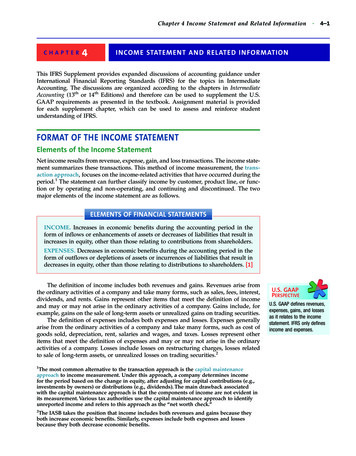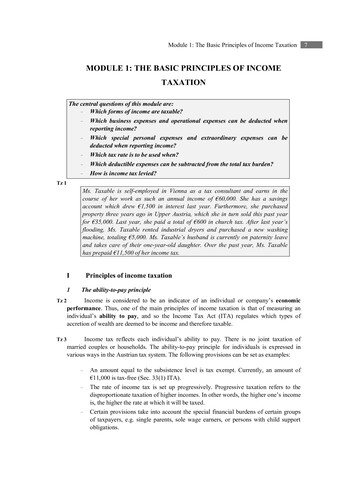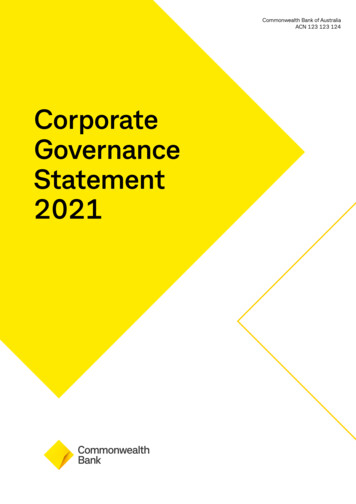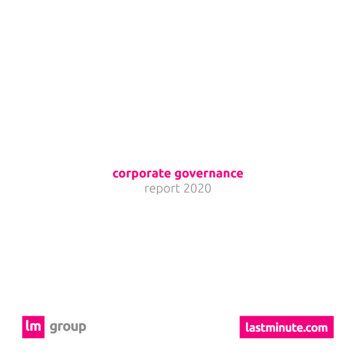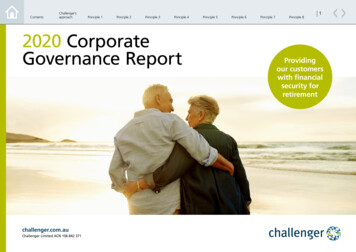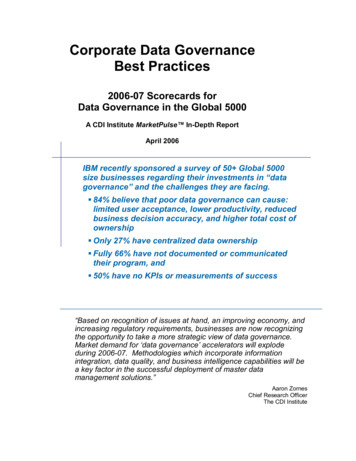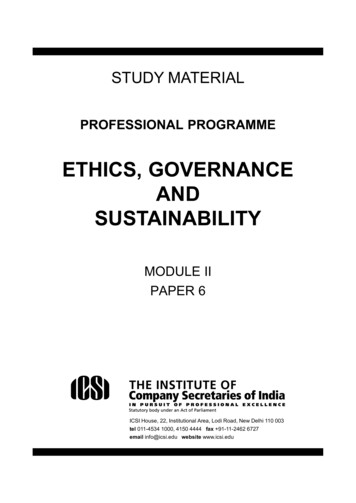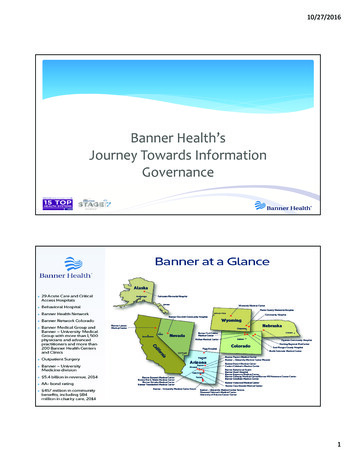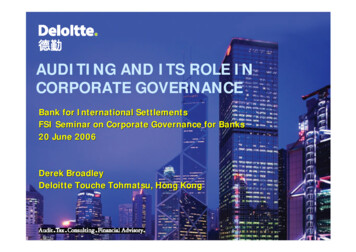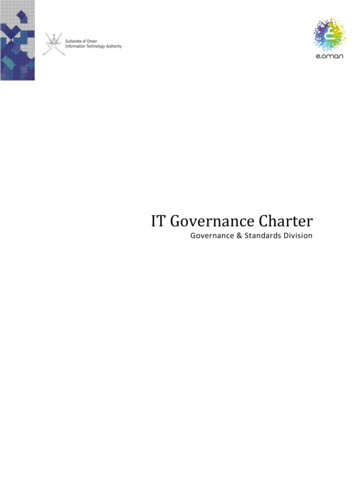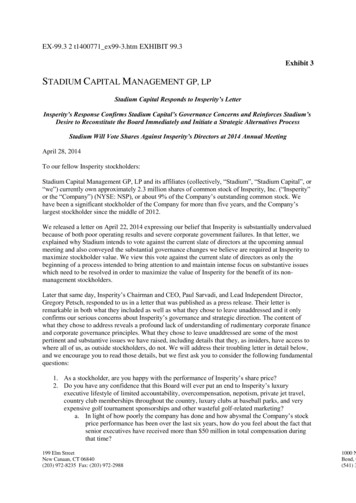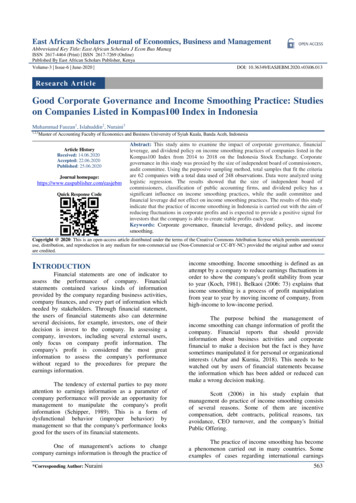
Transcription
East African Scholars Journal of Economics, Business and ManagementAbbreviated Key Title: East African Scholars J Econ Bus ManagISSN 2617-4464 (Print) ISSN 2617-7269 (Online)Published By East African Scholars Publisher, KenyaVolume-3 Issue-6 June-2020 DOI: 10.36349/EASJEBM.2020.v03i06.013Research ArticleGood Corporate Governance and Income Smoothing Practice: Studieson Companies Listed in Kompas100 Index in IndonesiaMuhammad Fauzan1, Islahuddin2, Nuraini31,2,3Master of Accounting Faculty of Economics and Business University of Syiah Kuala, Banda Aceh, IndonesiaArticle HistoryReceived: 14.06.2020Accepted: 22.06.2020Published: 25.06.2020Journal homepage:https://www.easpublisher.com/easjebmQuick Response CodeAbstract: This study aims to examine the impact of corporate governance, financialleverage, and dividend policy on income smoothing practices of companies listed in theKompas100 Index from 2014 to 2018 on the Indonesia Stock Exchange. Corporategovernance in this study was proxied by the size of independent board of commissioners,audit committee. Using the purposive sampling method, total samples that fit the criteriaare 62 companies with a total data used of 248 observations. Data were analyzed usinglogistic regression. The results showed that the size of independent board ofcommissioners, classification of public accounting firms, and dividend policy has asignificant influence on income smoothing practices, while the audit committee andfinancial leverage did not effect on income smoothing practices. The results of this studyindicate that the practice of income smoothing in Indonesia is carried out with the aim ofreducing fluctuations in corporate profits and is expected to provide a positive signal forinvestors that the company is able to create stable profits each year.Keywords: Corporate governance, financial leverage, dividend policy, and incomesmoothing.Copyright @ 2020: This is an open-access article distributed under the terms of the Creative Commons Attribution license which permits unrestricteduse, distribution, and reproduction in any medium for non-commercial use (Non-Commercial or CC-BY-NC) provided the original author and sourceare credited.INTRODUCTIONFinancial statements are one of indicator toassess the performance of company. Financialstatements contained various kinds of informationprovided by the company regarding business activities,company finances, and every part of information whichneeded by stakeholders. Through financial statement,the users of financial statements also can determineseveral decisions, for example, investors, one of theirdecision is invest to the company. In assessing acompany, investors, including several external users,only focus on company profit information. Thecompany's profit is considered the most greatinformation to assess the company's performancewithout regard to the procedures for prepare theearnings information.The tendency of external parties to pay moreattention to earnings information as a parameter ofcompany performance will provide an opportunity formanagement to manipulate the company's profitinformation (Schipper, 1989). This is a form ofdysfunctional behavior (improper behavior) bymanagement so that the company's performance looksgood for the users of its financial statements.One of management's actions to changecompany earnings information is through the practice of*Corresponding Author: Nurainiincome smoothing. Income smoothing is defined as anattempt by a company to reduce earnings fluctuations inorder to show the company's profit stability from yearto year (Koch, 1981). Belkaoi (2006: 73) explains thatincome smoothing is a process of profit manipulationfrom year to year by moving income of company, fromhigh-income to low-income period.The purpose behind the management ofincome smoothing can change information of profit thecompany. Financial reports that should provideinformation about business activities and corporatefinancial to make a decision but the fact is they havesometimes manipulated it for personal or organizationalinterests (Azhar and Kurnia, 2018). This needs to bewatched out by users of financial statements becausethe information which has been added or reduced canmake a wrong decision making.Scott (2006) in his study explain thatmanagement do practice of income smoothing consistsof several reasons. Some of them are incentivecompensation, debt contracts, political reasons, taxavoidance, CEO turnover, and the company's InitialPublic Offering.The practice of income smoothing has becomea phenomenon carried out in many countries. Someexamples of cases regarding international earnings563
Muhammad Fauzan et al.; East African Scholars J Econ Bus Manag; Vol-3, Iss- 6 (June, 2020): 563-571management practices are Enron, which in 2001 provedmanipulate financial statements with Arthur Anderson'saccounting firm, and a World Company that claimedhave manipulated profits nearly five billion US dollarsin the period 2001 to 2002 (Tuanakotta, 2007: 138). InIndonesia, several cases of income smoothing atcompanies which have been gone public are PTSaratoga Investama Sedaya Tbk. in 2016 and PT Timah(Persero) Tbk in 2015. Both companies are suspectedhave inflated the profits in the financial statements andhad a bad impact on decision making for the users of itsfinancial statements (Agustiana et al., 2017). In theliterature review, there are several factors that influenceearnings smoothing practices such as corporategovernance mechanisms (Solomon and Solomon 2004:Mehrazeen and Mehrtash 2012), the board ofcommissioners (KNKG, 2006; Vafeas, 2000), auditcommittees (Chtourou et al., 2001; Xie et al., 2003), thequality of public accounting firms (Soselisa andMukhlasin, 2008; Chung et al., 2005; DeAngelo (1981),Financial leverage (Subramanyam, 2013; Jones andSharma, 2001; Alexandri and Anjani 2014) anddividend policy (Sulistiyawatiwati , 2013; Fiscal andSteviany, 2015).Mehrazeen and Mehrtash (2012) in their studyexplained that the mechanism of corporate governanceis a process that can control andsupervise the way of acompany to be more directed and according withinterests of agents and principals. This mechanism startsfrom having an independent board of commissioners, anaudit committee, managerial ownership and auditquality. Solomondan Solomon (2004) in his researchstated that the mechanism of good corporategovernance will increase the value added of company inpublic. The role and function of good corporategovernance is to increase financial information quality(Nuraini, 2015).An independent board of commissioners is an importantcomponent that must have in a company in order to geta good oversight function (Vafeas, 2000). KomiteNasional Kebijakan Governance (2006) explains thatthe board of commissioners is a part of the corporationwhich is simultaneously responsible for supervising andproviding advice or recommendation to the directorsand ensuring that the company had carried out corporategovernance well. Vafeas (2000) defines an independentboard of commissioner is company supervisory groupswho able to limit the level of earnings managementthereby increasing earnings quality by utilizing themonitoring function of financial reporting.Chtourou et al., (2001) in their research resultsprove that the audit committee has an influence onincome smoothing. This is evidenced by companies thathave an audit committee will tend to produce qualityfinancial reports, so it can reduce the risk of fraud infinancial reporting. In this case audit committee acts asa controller in the financial reporting process. Similar East African Scholars Publisher, Kenyaresults were also found in the study of Xie et al., (2003)which examines the impactiveness of audit committeesin reducing earnings management by management. Theresult is that the audit committee is able to protect theprincipal's interests from earnings management actionswhich did by agent.The quality of financial statement informationcan be generated through a quality audit process .Theaudit quality of the Public Accounting Firm caninfluence the risk of accounting fraud which has did bya company (Soselisa and Mukhlasin, 2008). Chung etal., (2005) argues that companies which manipulateprofits will tend to avoid using large accounting firmsand have a high reputation. DeAngelo (1981) concludesthat large public accounting firms are considered havebetter audit quality and more independence in carryingout their audit, thereby increasing the risk of disclosureof earnings manipulation by companies.Financial leverage is a way to assess acompany's ability to meet its obligations through acomparison of debt with equity (Subramanyam,2013).A company which have high debt levels will tendto practice income smoothing, where try to maintain thestability of their profits in order to fulfill debtagreements (Jones and Sharma, 2001). Alexandri andAnjani (2014) in their research explained that a highleverage ratio in a company will have an impact on thedecrease in lender confidence to provide loans to thecompany, where the debt ratio ratio provides anoverview of the capital structure and the level ofuncollectible risk of a debt, so that it can the companyto do practice of income smoothing.Another factor that can trigger incomesmoothing practices is dividend policy. Dividend policyis a policy regarding decisions on profits derived bycompanies that will be distributed as dividends orbecome retained earnings. Although the dividend policyis determined at the General Meeting of Stakeholders,company management can provide an overview orestimate of the amount of profit that can be distributedto stakeholders (Sulistiyawati, 2013). The tendency ofinvestors to only look at dividend distribution policy asa basis for investment considerations encouragesmanagement to practice income smoothing. Thedividend distribution policy which is carried out by thecompany every year gives a positive signal to investorsthat the company is able to create a stable profit everyyear, so that it indirectly contributes to increasinginvestor confidence in management that the companyhas been managed impactively and efficiently (Fiscaland Steviany, 2015).This study reexamined the impact of corporategovernance, financial leverage and dividend policy onincome smoothing practices in Indonesia, especially incompanies incorporated in the Kompas100 Index on theIndonesia Stock Exchange for the 2015-2018 period.564
Muhammad Fauzan et al.; East African Scholars J Econ Bus Manag; Vol-3, Iss- 6 (June, 2020): 563-571The Kompas100 Index is a group of shares ofcompanies going public issued by the Indonesia StockExchange in cooperation with Kompas Media as manyas 100 companies. Issuers listed in the index aresummarized from various business sectors and havegone through a screening process of the total issuerslisted on the Indonesia Stock Exchange (Suruji, 2011).The performance of Kompas100 index is often used asa reference for investing, because the Kompas 100index is better than the Composite Stock Price Indexand is not too volatile as the LQ-45 index.EMPIRICAL LITERATURE REVIEWAND HYPOTHESIS DEVELOPMENTAgency TheoryThe practice of income smoothing often arisesbecause there is a conflict of interest between the agentand the principal. Jensen and Meckling (1976) suggestthat agency theory is a theory that explains therelationship or contract between the principal(shareholder) and the agent (management), and itassumed to be motivated by their own interests, so thatmaking conflict of interest between them. Agencytheory explains that the agency relationship arises whenthe principal makes use of an agent and then give theagent the decision-making authority. The granting ofsuch authority will cause agency problems, theinequality of interests between the principal and agent.The results of the literature review prove thatthe relationship between agents and principals is oftendetermined by accounting numbers (Watts andZimmerman 1986). In the decision making process,users of financial statements really like earningsinformation as a reference to measure companyperformance. This condition can encourage managers toopportunistically choose accounting policies that are inaccordance with their interests (Belkaoui, 2005).Management is motivated to do earnings management,income smoothing or even motivated to do earningsmanipulation.Earning Management and Income SmoothingEarnings management is an act of managerswho choose accounting policies to achieve their specificobjectives. The accounting policy which use is accrualsin preparing financial statements (Scott, 2015).Managers choose accounting policies to influenceearnings information. Influenced earnings informationcan be enlarged or reduced according to the manager.Subramayam and Wild (2013) states that thereare 3 (three) main aspects in the definition of earningsmanagement, namely: (1) Earnings management can bedone by using judgment. Examples of judgments suchas estimates of economic life and residual value of fixedassets, deferred taxes, determine the accountingmethods to be used such as depreciation methods andcost methods. (2) The purpose of earnings management East African Scholars Publisher, Kenyais to mislead stakeholders regarding the company'seconomic performance because management has accessto information that cannot be accessed by outsiders. (3)Shifting the period of cost or income. Examples such asaccelerating or postponing expenses for research anddevelopment until the next accounting period,promotional expenses, setting the time for the sale offixed assets that are not used.Earnings management can be done with avariety of patterns such as Taking a bath, ing, Offsetting extraordinary / unusual gains,Aggressive accounting applications, Timing Revenueand Expense Recognition (Scott, 2011: 383), there isflexibility in Generally Accepted Accounting Principles(GAAP) through the practice of creative accounting, sothat management can make or change variousaccounting policies to enhance financial statements(Mulford and Comiskey, 2002: 88). As for other termsthat are commonly used in financial number games,namely aggressive accounting, income smooting,fraudulent financial reporting, and creative accountingpractices (Mulford and Comiskey, 2002: 12).Income smoothing is one form of earnings managementin which income and expenses are shifted betweenperiods to reduce earnings fluctuations (Arens et al.,2005: 310). The main objective of income smoothing isto show the company's performance and financialcondition. The purpose behind the management ofincome smoothing can still change the informationcontent of the profits generated by the company. Suchconditions need to be watched out by users of financialstatements because the information that has been addedor reduced can mislead decision making (Juniarti andCorolina, 2005).The Impact of Financial Leverage on IncomeSmoothing PracticeJones and Sharma (2001) in their researchresults showed that financial leverage proxied throughdebt to equity ratio affects the income smoothingpractices of manufacturing companies on the AustralianStock Exchange. This shows that the higher the value ofdebt to equity ratio, the company will tend to practiceincome smoothing because the company tries tomaintain the stability of their profits to avoid offensedebt agreement. Indrawan (2018) also explained thatcompanies which have high debt ratios will impact onthe high risks investors. It makes investors demandcompanies to be able to provide a high level of profit aswell, so companies will tend to practice incomesmoothing in order to maintain the company'sattractiveness to investors.H1: Financial leverage has a positive impact on IncomeSmoothing Practice565
Muhammad Fauzan et al.; East African Scholars J Econ Bus Manag; Vol-3, Iss- 6 (June, 2020): 563-571The Impact of Classification of Public AccountingFirms on Profit Smoothing PracticeDeAngelo's (1981) study results explain thatcompanies that use big four public accounting firms thathave high reputations tend not to practice incomesmoothing, because big four public accounting firmshave high audit quality and have a good reputation, sothe risk of disclosure of fraud committed bymanagement is greater compared to ordinary non-bigpublic accounting firms. The same results are also theresearch of Sulistiyawati (2013), Shubita (2015), andChung et al.,(2005) which shows that the higher thelevel of competence of public accounting firms will beable to detect errors or fraud in the presentation offinancial statements, so that the classification of publicaccounting firms is considered to have a significanteffect on the practice of income smoothing.In the results of research Chung et al.,(2005)concluded that big four public accounting firms auditorstend to provide high quality audit services to certainclients rather than non big four public accounting firmsauditors because the dependence of the auditor'seconomic problems on such clients can be ignored forbig four public accounting firms auditors. In addition,the big four auditor will also have a greater loss in thecase of an audit failure, compared to a non big auditor,so the greater the classification of the firm that performsaudit tasks in a company, the less likely a company is topractice income smoothing.Classification of public accounting firms willdetermine the credibility of a financial statement. Thedetection of financial statements that have beenmanipulated is expected to be revealed through goodaudit quality, so as to reduce the practice of incomesmoothing (DeAngelo, 1981). Companies that doincome smoothing will tend to avoid using big publicaccounting firms services (big-four) because themanager will be revealed cheating which will also harmthe manager itself and also the company, so the greaterthe name of the public accounting firms that audits thecompany, the less chance of managers doing incomesmoothing practices (Prasetya and Nur Rahardjo, 2013).H2: Classification of public accounting firms has anegative impact on income smoothing practiceThe Impact of Independent Board of CommissionersSize on Income Smoothing PracticeThe more members of the board ofcommissioners in a company, it will make it easier forthe board of commissioners in carrying out their role ascontrolling the management, easy to supervise andcontrol the actions of management, including indecision making which is useful for the company. Thisshows that the greater the size of the board ofcommissioners, the smaller the opportunity formanagement to practice income smoothing (Vafeas,1998). Yang, Leing Tan, and Ding (2015) also argues East African Scholars Publisher, Kenyathat the size of the board of commissioners influenceincome smoothing, where the existence of independentparties in the company minimizes management to doincome smoothing.H3: The size of the independent board ofcommissioners has negative impact on incomesmoothing practiceThe Impact of the Audit Committee on IncomeSmoothing PracticeChtourou et al., (2001) in their research resultsshowed that the larger size of the audit committee, itmore difficult for management to do income smoothingpractices. This is based on the fact that the greater theaudit committee formed by the board of commissioners,the easier it will be to detect the possibility of incomesmoothing practices carried out by the company'smanagement. The research of Xie, Davidson, & Dadalt(2003) and Yang, Leing Tan, and Ding (2015) alsorevealed the same results that the audit committeeinfluences the practice of income smoothing, where theaudit committee is able to protect pincipal interestsfrom earnings management actions carried out byparties agent.H4: The audit committee has a negative impact onincome smoothing practiceThe Impact of Dividend Policy on Practice ofIncome SmoothingDetermination of amount of dividend isdepending on the amount of profits obtained by thecompany through the dividend payout ratio. Investorslike the high level of dividend distribution, socompanies try to maintain the stability of their profits sothey can provide a stable level of dividends to investors.The demand of high dividends make management topractice income smoothing (Sartono, 2004). ResearchBudiasih (2009) and Paramita (2016) states that thegreater the dividend payout ratio illustrates the moreprofits generated by the company. In addition, investorsalso favor companies that provide large dividends, sothe greater the dividend payout ratio, the more itencourages managers to practice income smoothing.H5: Dividend policy has positive impact on incomesmoothing practiceDATA AND METHODOLOGYThe data used in this study is a balanced paneldata, which is research in which data is collected inseveral observation periods and has the same number ofobservations each year. The population in this study arecompanies listed on the Indonesia Stock ExchangeKompas100 Index for the 2015-2018 period.The sample selection is carried out based onthe purposive sampling method with the criteria of thecompany being joined by the Kompas100 index in arow during the 2015-2018 period and never delisted;issue a complete and audited annual financial report566
Muhammad Fauzan et al.; East African Scholars J Econ Bus Manag; Vol-3, Iss- 6 (June, 2020): 563-571during the observation period; and during theobservation period the company never suffered a loss.The process of calculating the criteria for determiningthe sample is:Table 1. Sample Determination CriteriaAmountsSample Determination CriteriaCompaniesCompanies that have been incorporatedin Kompas100 since 2015-2018125The company has been delistinated fromKompas100 Index during the period ofobservation(59)The company that suffered losses duringthe period 2015-2018Total of sample(4)Based on the entire population, a sample of 62companies is included in the Kompas100 Index for 4(four) years and the total data used is 248 observationdata.of62with the company's articles of association and providean input to the board of directors (Barnes, 2006). Thesize of the board of commissioners is measured by theformula Total members of the board of independentcommissioners divided by total members of the boardof commissioners of the company.Measurement VariablesIncome SmoothingThe measurement of income smoothinguses the Eckel Index. Eckel index is used to indicatewhether a company practices income smoothing or notthrough this formula (Eckel, 1981).CV IEckel Index CV SFinancial leverageFinancial leverage is used to determine theratio between financing and funding through debt andequity, and it called debt to equity ratio (Brigham andHouston, 2001: 87). The debt to equity ratio calculationformula is total debt divided by total equity.Audit CommitteeAudit committee is a committee which formedand responsible to the board of commissioners to helpcarry out the duties and functions of the board ofcommissioners, consisting of at least 3 (three) membersand must be chaired by an Independent Commissionerand at least one of them have capabilities in accountingand finance (POJK, 2015). The audit committee ismeasured by the total members of the independent auditcommittee for the total members of the auditcommittee.Dividend PolicyDividend policy is a management policy todistribute cash dividends to stakeholders. Dividendpolicy is calculated through the dividend payout ratiopaid by the company, where the dividend per share iscompared to earnings per share (Subramanyam, 2013:45).Classification Of Public Accounting FirmsClassification of public accounting firmsvariable is used as a dummy variable, where companieswhose financial statements are audited by Big-Fourpublic accounting firms are given a value of 1 (one) andcompanies whose financial statements are not auditedby Big-Four public accounting firms are given a valueof 0 (zero).RESULTS AND DISCUSSIONDescriptive statisticsDescriptive statistics aim to display a generaldescription of the research sample. Descriptive statisticsfor all variables in this study can be seen in Table 2.The Size of Independent Board of CommissionersThe size of independent board ofcommissioners is part of a company that has duty toconduct overall and detailed supervision in accordanceLEVKKAPDKOMKAKDIVN6262626262Table 2. Descriptive StatisticMin MaxMeanStd. of Deviation.045 10.760 1.7292862.1276.000 1.000.790323.4104.166 .800.437813.1337.333 .750.559370.1366.000 .902.273812.2241Income Smoothing62.000 East African Scholars Publisher, Kenya1.000.870968.3379567
Muhammad Fauzan et al.; East African Scholars J Econ Bus Manag; Vol-3, Iss- 6 (June, 2020): 563-571Descriptive statistical results there are 54companies indicated to practice income smoothing.While the remaining 8 companies are suspected of notdoing income smoothing practices.Based on the classification of publicaccounting firms, it shows that as many as 79% ofcompanies use public accounting firms affiliated withbig-four public accounting firms or 49 companies andthe remaining 13 companies use non-big-four publicaccounting firms. This reflects that quite a number ofcompanies are using the services of external auditorsaffiliated with the Big-Four public accounting firm inthe expectation that the opportunities for managers toget income are getting smaller.The feasibility of a regression model testTable 3. Hosmer and Lemeshow TestChi-squareDfSig.5.7328.632Step1The results of feasibility of a regression model test (goodness of fit test) measured by the Chi-Square value inthe Hosmer test and the Lemeshow Goodness of Fit Test showed that the Chi-Square table value for df 8 was 5,732 witha significance of 0.632. Significance 0.05, it can be concluded that the empirical data fits the model.Coefficient of Determination (R2)Nagelkerke's R Square, the value of R Square (R2) shows how much influence the independent variable has onthe dependent variable. The value of R2 lies in the 0 intervalR 2 1 interval. If R2 gets closer to 1, the greater theproportion of contributions of the independent variables together in explaining the variation of the independent variablesand vice versa. The results of the analysis of Nagelkerke’s R Square test are :Step1Table 4. Model Summary-2Log Cox & Snell R Nagelkerke RlikelihoodSquareSquare14.160a.605.796The Nagelkerke R Square value is 0.796. Thisshows that the proportion of contribution of theindependent variables together in explaining thevariation of the independent variables was 79.6%, whilethe other influenced by other factors not included in thismodel.Logistic Regression AnalysisThe result of regression of panel data that hasinfluence on financial leverage, classification of publicaccounting firms. Independent Board of CommissionersSize, audit committee, and dividend policy can be seenin table 5.Table 5. The result of Data AnalysisStep .584.018.043.8771.296.744.9361.182.000Based on table 5, the results of hypothesis testcan be seen as follows:Y -15,455 - 0,188X1 - 0,932X2 – 0,295X3- 0,096X4 0,388X5The Impact of Financial Leverage on IncomeSmoothing PracticeHypothesis testing results indicate that value ofthe financial leverage is 4.463 with a significance levelof 0.135 (P value 0.05), which means that the H1 East African Scholars Publisher, Kenyahypothesis is rejected. Thus it can be said that thefinancial leverage variable partially has no significantimpact on income smoothing practices. This indicatesthat the higher value of financial leverage, it tends tolower motivation of the company's management topractice income smoothing, in which case the companytries to avoid defaulting on debt agreements, and viceversa.The results of this study contradict with thehypothesis, but support the results of research of568
Muhammad Fauzan et al.; East African Scholars J Econ Bus Manag; Vol-3, Iss- 6 (June, 2020): 563-571Zarnegar and Hamidian (2016), Fengju et al.,(2013),and Fiscal and Steviany (2015) which explain thatfinancial leverage has no impact on income smoothingpractices, this is because a high debt to equity ratio willencourage corporate managers to avoid incomesmoothing actions to prevent failure of debt paymentsin the future , in other words the company has goodplan to pay their debts to avoid the practice of incomesmoothing.The Impact of Classification of Public AccountingFirms on Income Smoothing PracticeHypothesis testing results show the value ofWald from the classification of public accounting firmsat 4.887 with a significance level of 0.036 (P value 0.05), which means that the classification of publicaccounting firms has a significant effect with a negativedirection on the practice of income smoothing and H2hypothesis is accepted. This result can be interpretedthat companies that are audited by big-four publicaccounting firms on average have a small level ofincome smoothing practices.The reputation of the big-four publicaccounting firm is able to influence corporatemanagement in the practice of income smoothing. BigFour public accounting firm is considered to have betteraudit quality and more independence in carrying out itsaudit duties, thereby increasing the risk of disclosure ofearnings manipulation by the company.The results of this study are consistent with theresults of research Sulistiyawati (2013) and DeAngelo(1981) which states that companies that use publicaccounting firms that are classified as big-four publicaccounting firms tend not to practice incomesmoothing, because public accounting firms big-fourhas high audit quality and has a reputation which isgood, so the risk of disclosure of fraud committed bymanagement is higher than non-big-four publicaccounting firms.The Impact of Independent Board of CommissionersSize on Income Smoothing PracticeHypothesis testing results show the value ofthe Independent Board of Commissioners Size is 2.591
good for the users of its financial statements. One of management's actions to change company earnings information is through the practice of income smoothing. Income smoothing is defined as an attempt by a company to reduce earnings fluctuations in order to show the company's profit s
